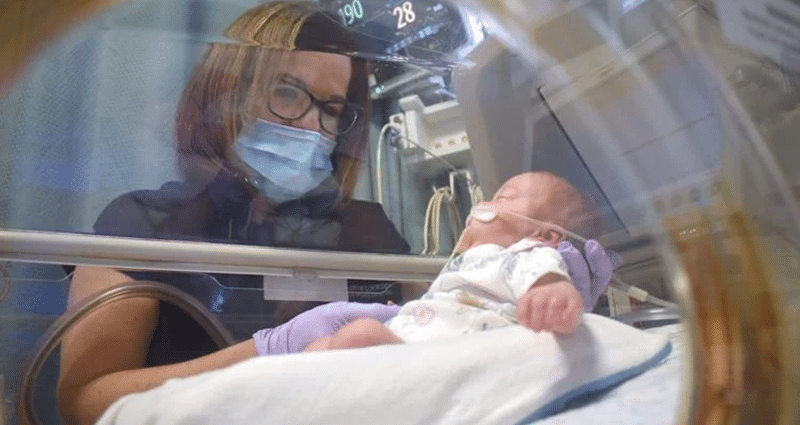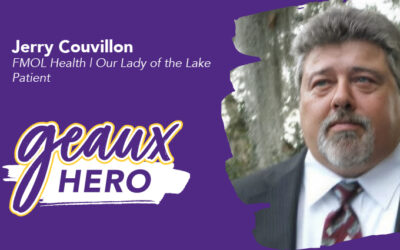Jen Arceneaux, RNC-NIC, begins each day in the Our Lady of Lourdes Women’s & Children’s Hospital Neonatal Intensive Care Unit (NICU) with a smile.
It’s how she greets the babies in her care. During her first assessment, she talks to them just like she would with her own newborn. The conversation continues as Arceneaux performs a gentle cleaning and gets the babies ready for the day.
“You can always tell if they are happy. We get a smile sometimes, which is always a great moment,” she said. “We play and talk a lot. It’s very rewarding when you are at the bedside, especially with the family, and a baby opens their eyes for the first time or they give you a little smirk that shows a feisty side. We celebrate all of those milestones.”
In addition to her role as a NICU nurse, Arceneaux also is a member of the hospital’s NICU Transport Team. She has held both positions for more than a decade. For Arceneaux, the roles combine the intense pace she appreciates in her career with a desire to work with children.
“We wear a lot of hats in the NICU,” she explained. “We attend deliveries if we think they may need intervention right away, if the mom has had complications during the pregnancy or if the baby is coming too early. Our work carries on into the NICU once the baby is born. Some have infections or need extra respiratory support. A lot of the babies are born premature and stay in the NICU until it is closer to their due date.”
Nurses like Arceneaux are a “godsend” for NICU patients and families, according to Heidi Pattillo, whose daughter, Harper LeBlanc, was born on Jan. 30 at just 24 weeks, weighing about 1 pound 1.6 ounces. She remains in the NICU but is doing well and reaching important milestones.
“The nurses and doctors have been amazing,” Pattillo said. “They are so comforting and answer any questions we have every step of the way. I leave there every day knowing that my daughter is taken care of. They treat the babies like they would their own kids. One of the nurses even told me she goes home at night and prays for the babies.”
Because many babies stay in the NICU for several days or even weeks, Arceneaux said she and other team members become close with their parents as well. Those relationships help Arceneaux serve as a stronger advocate for babies and guide interactions with them. For example, if Arceneaux knows a baby has had a difficult morning, she will encourage parents to sit quietly with them and avoid much activity. If the baby is in an upbeat mood, there can be more interaction.
“We know this is a lot for the families to take in all at once, and we know it can be overwhelming,” she said. “We make it a point to tell them what we are doing every step of the way. What we try to ingrain in our families is that the more they are present, the better outcomes the baby will have. The more involved families are in their care, the better they will feel at discharge about going home.”
Pattillo said the NICU team has helped her foster a stronger connection with her daughter. For instance, when Harper was still on a breathing tube, Pattillo was able to hold her a few times. The process required five nurses to place Harper in the proper position. Now that Harper is more stable, Pattillo is able to hold her every day with the help of the nursing team.
“It’s like finally being able to be with my baby when I hold her,” Pattillo said. “I think she knows her mom is there with her.”
Arceneaux also works with families to mark milestones along the way, such as baby’s first bath, first visitor and the first time the baby is held. The NICU team creates certificates to celebrate the occasions and sends families home with the mementos to mark the baby’s progress.
Many parents won’t remember much of what is said during initial conversations with nurses, physicians and other care team members, Arceneaux said. That’s why the NICU team makes sure to repeat information and be available to answer questions. It’s their way of living out the We Listen. We Heal. philosophy of the Franciscan Missionaries of Our Lady Health System.
“I’m always watching the parents’ body language, then give them time to process things before touching base again,” Arceneaux said. “We reassure them and let them know we are here. We know it’s overwhelming, so we make a point to have multiple conversations and let them know our doors are always open when they do think of questions.”
That communication was especially important to Pattillo when Harper had to undergo a special heart procedure. Patillo said a doctor first explained the surgery to Pattillo and her family. During surgery, one nurse went above and beyond to keep the family informed.
“She actually had her phone with her and would call and text me to share updates from the operating room,” Pattillo said. “That really gave me peace of mind because everything was extremely nerve-wracking. Everyone is just so down to earth and so helpful.”
The NICU Transport Team travels to smaller hospitals in surrounding communities to treat babies in need. Once the team arrives at a hospital, they use the latest technology to provide respiratory support and other necessary care. Once the baby is stabilized, the team uses a specially designed transport incubator with a high frequency ventilator and transport cooling blanket to bring the infant to Our Lady of Lourdes Women’s & Children’s Hospital for additional care.
To become a member of the transport team, a person must have two or more years of Level III experience in a NICU, meaning they have treated the most critical babies. They also must hold certifications and undergo specific training before being assigned to the team. Arceneaux has been a transport team member since 2007.
“I enjoy working in the NICU environment, but I also knew I wanted to do even more,” she said. “I knew there was a need in our outlying hospitals, and I knew I wanted to do what I could to help meet that need.”
Although Arceneaux’s work can be stressful, she said the rewarding moments far outweigh the negative times. She has become close with many families, and former NICU babies will sometimes visit as they grow into healthy children. She receives cards and photos around the holidays. The hospital also hosts reunion events for families and staff to see each other’s progress.
“I think people see the NICU as a scary place, but we definitely have more good days than bad,” she said. “Those babies are some of the strongest fighters out there. It’s really rewarding to watch them progress from the time of birth until they are discharged and then to see how they are doing so well after they leave us. So many of them have the odds stacked against them, and they end up thriving. It’s become really special.”




